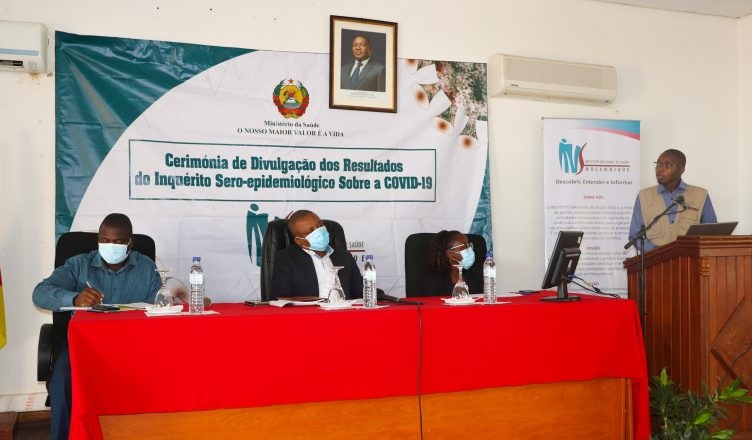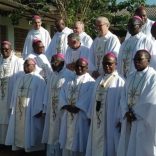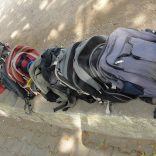Mozambique: Sasol breaks ground on new water supply system in Inhassoro
Mozambique: INS announces coronavirus exposure rates for Gaza

Photo: MISAU
In the two main cities of the southern Mozambican province of Gaza, Xai-Xai and Chokwe, 3.7 and 5.2 per cent of the population respectively have been exposed to the coronavirus that causes the Covid-19 respiratory disease, according to a survey undertaken in the two cities by the National Health Institute (INS).
This survey, like earlier surveys held in other Mozambican cities, used a simple blood test. This does not show whether the person tested is currently infected with the coronavirus, but it does show whether there are coronavirus antibodies in his bloodstream, which is evidence that he has been in contact with the virus.
The survey took a random sample of Xai-Xai and Chokwe households, but also looked more closely at key professional groups, such as market sellers, transporters, health workers and police.
The total sample size in Xai-Xai was 6,270, and in Chokwe it was 3,412. According to the 2017 census, the total population of Xai-Xai and Chokwe then was 132,884 and 67,954 respectively
Announcing the results of the survey on Tuesday, INS official Paulo Arnaldo said that, up to Sunday, 269 cases of Covid-19 had been diagnosed in Xai-Xai and 145 in Chokwe. In Gaza province as a whole 537 cases had been diagnosed.
But the number of people found to be carrying the virus during a standard PCR (polymerase chain reaction) test, will inevitably be much fewer than those exposed to the virus and carrying antibodies in their bloodstream.
Arnaldo said the purpose of the survey was to identify and map the areas of greatest transmission of the coronavirus and to identify the age groups and professional groups most affected.
The preliminary results from Xai-Xai showed that 3.7 per cent of those in randomly selected households who took the blood test were carrying the coronavirus antibodies. The figure varied among the city neighbourhoods, from just 1.2 per cent in Praia Cimento to 6.6 per cent in Patrice Lumumba B (Praia Cimento, as its name suggests, is on the beachfront, while Patrice Lumumba is in the heart of the city).
As for age groups, 4.9 per cent of people aged 35 to 59 and 4.7 per cent of those aged 60 and above had been exposed to the virus. The figure fell to four per cent among people aged 15 to 34 and to 2.5 per cent in children under the age of 15.
The professional groups most at risk were market sellers. 5.9 per cent of those tested carried the antibodies. The figure for health workers was 5.7 per cent, for transport operators 3.8 per cent, for shop workers 3.3 per cent, and for the defence and security forces 1.7 per cent.
In Chokwe, the survey found 5.3 per cent of the household survey had been exposed to the coronavirus. The exposure varied in the city neighbourhoods between two per cent and 8.4 per cent. This is the highest prevalence of antibodies found in any city.
In a reverse of the Xai-Xai situation, in Chokwe children were the most exposed to the virus, and the elderly were the least exposed. 5.6 per cent, both of children under the age of 15 and youths aged between 15 and 34, were carrying the antibodies. The figure fell to 4.6 per cent among those aged between 35 and 59, and to 3.3 per cent among those aged 60 and above.
In Chokwe, the professional groups most exposed to the virus were transport operators (16.1 per cent of the sample), the defence and security forces (10.4 per cent), and health workers (10.3 per cent).
Arnaldo noted that “all age groups are exposed to the coronavirus in Xai-Xai and Chokwe, but the exposure is greater in adults and the elderly in Xai-Xai, and in children and adolescents in Chokwe”. Transmission of the virus was scattered throughout all neighbourhoods in both cities.
The INS has now held epidemiological surveys in 11 Mozambican cities, and the prevalence of coronavirus antibodies in the random samples of the communities in those cities was as follows:
- Chokwe 5.3 per cent
- Beira 5.2 per cent
- Nampula 5.0 per cent
- Maputo 3.8 per cent
- Xai-Xai 3.7 per cent
- Matola 3.6 per cent
- Pemba 2.5 per cent
- Quelimane 2.5 per cent
- Chimoio 1.4 per cent
- Tete 0.7 per cent
- Lichinga 0.7 per cent












Leave a Reply
Be the First to Comment!
You must be logged in to post a comment.
You must be logged in to post a comment.